- Home
- Bette Lee Crosby
Emily, Gone Page 3
Emily, Gone Read online
Page 3
He steadied the wheel with the stump of his left arm, reached next to the ashtray with his right hand, and pushed in the lighter. After several seconds he put the joint he’d taken from Vicki in his mouth, lit it, then leaned forward, struggling to see the road.
Annoyed that he now had what she’d given up, Vicki turned her face and stared aimlessly out the side window. They inched along for a good twenty minutes; then she spied something in the distance.
“Stop here!” she shouted.
Murphy slowed the car and eased onto the grassy bank. “What now?”
She turned with a mischievous grin and pointed to a small house barely visible from the road. “I’m gonna knock on the door and ask if they can spare a bit of food.”
Murph leaned toward the side window and saw the shadow of a sloped roof.
“Are you some kind of crazy? That place is pitch-black. Nobody’s home, or else they’re asleep.”
Vicki giggled. “This is the boonies. Maybe they left the door unlocked like my mom used to do.”
“So what? Even if it’s standing wide open, you can’t just walk in and take what you want. News flash, babe. That can get you tossed in the slammer.”
“Not if I’m in and out before they know I’m there!”
Vicki slid out of the car before he could stop her. As she eased the door shut she heard him hiss, “If you’re not back in five minutes, I’m leaving without you.”
“Better not,” she answered and disappeared into the darkness.
At first Vicki thought she would knock on the door, maybe lie a bit and say her husband was a wounded vet looking for work and they’d fallen on hard times. As she neared the house, the silence of it intimidated her. She bypassed the front porch and circled around the far side, passing a small window out of reach for her to see anything but the faint glow of a night-light.
Once she rounded the corner she found the rail of a back porch. Lifting her foot onto the first step, she exerted the tiniest bit of pressure and listened for a telltale squeak. There was nothing. Ever so slowly she ventured up the four steps and onto the porch.
Straight ahead was a door, and beside it a window. Vicki inched her way across the floorboards and peered inside. With the sky clouded over and no moonlight, the house was hidden in darkness, but when she pressed her face to the glass she could make out a large white cabinet.
This had to be the kitchen.
She moved over to the door, placed her hand on the knob, and turned. It gave way with no resistance—unlocked, just as her mom’s always was. With a gentle push she eased it open and stood looking at the room. The refrigerator was on the far wall and beside it a stove. No, not a stove, a sink.
As her eyes grew accustomed to the dark she saw a clearer definition of the room. Feeling reasonably confident, she stepped across the threshold, made her way over, and opened the refrigerator door. She was hoping for some cold chicken, sliced ham or cheese, but when the light came on it lit the room. What she saw took hold of her heart and ripped it open again.
Baby bottles.
On the counter beside the fridge in a dish drainer, three baby bottles left to dry. Memories flooded her mind, and everything came rushing back: the dashed promise of a new life, a baby born with tiny fingers and toes but no heartbeat. Tears welled in Vicki’s eyes, and the raging hunger she’d felt was gone. The piercing emptiness she’d lived with for the past seven months swelled inside her, and suddenly nothing else mattered.
She was already in the house. What harm would it do to take a quick peek inside the nursery? The light that had given her a glimpse into the room disappeared when the refrigerator door clicked shut. By then she’d already seen an opening to the hallway. She knew that’s where it would be: the room where she’d seen the glow of a lamp in the window. Remembering the teddy bear night-light she’d bought for Lara, she traced her fingers along the counter and made her way toward the far end of the room. When the cabinets ended, she reached out for the wall and ran her hand along it until she found the doorframe, then stepped into the narrow hallway. The first thing she saw was a triangle of soft yellow light coming from the room on the left.
Lara.
It was a small room, and in two long strides she stood beside the crib looking down at the baby. The child, her hair the same honeyed blonde Vicki remembered, was lying on her tummy with tiny fists raised alongside her head.
Months later, after she’d returned home, after it was too late to change anything, Vicki would think back on this moment. She would tell herself the marijuana was to blame, that she was mindless at the time, possessed by a blurred reality and too stoned to think straight. But as she stood there looking down at the child who was exactly as she imagined Lara, she considered it destiny. God was giving her back what she had lost.
With a soft cooing that was little more than a murmur, she lifted the sleeping child into her arms. Emily stirred, shifted her weight slightly, then leaned against Vicki’s chest.
Murph’s words flashed through her head.
If you’re not back in five minutes, I’m leaving without you.
No, she couldn’t let that happen.
In the blink of an eye she snatched up the lightweight blanket lying at the foot of the crib and wrapped it around the child as she turned toward the kitchen. Retracing her steps with an uncanny certainty, she hurried out the back door and down the steps.
Covering the child with her poncho, she climbed into the car and said, “They might have heard me; let’s get out of here quick.”
Murph gunned the motor and drove off, believing Emily to be nothing more than a ham or roast chicken.
“Did you get what you wanted?” he asked.
“Yes,” Vicki answered, then settled back, content to feel the beat of a tiny heart alongside hers.
THE DIXON HOUSE
The Next Morning
The rain continued on and off throughout the night, and when Rachel Dixon woke Monday morning it was to the sound of water dripping from the eaves. She cast a sleepy glance at the bedside clock, then nudged George.
“It’s almost seven.”
He rolled over and groaned. “Already? Is Emmy awake?”
Rachel shook her head and spoke in a whispery voice. “I haven’t heard her yet. I guess she’s catching up on all the sleep she missed, like us.”
With the sky still gray and clouded over, the room was deep in shadow, the way it was in the predawn hours before the sun broke free of the horizon.
Rachel pushed back the thin blanket and sat up. “I’d better—”
“Not yet.” George reached out, playfully pulled her back onto the pillow, and nuzzled his face in the curve of her neck. “It’s been a tough few days; let’s grab a few minutes more.”
“Her diaper is probably soaked.”
“If she were uncomfortable, she’d be fussing.” George curled his arm around his wife’s waist and pulled her closer.
“Five minutes,” he said, then closed his eyes and nodded off.
Rachel couldn’t go back to sleep, so she lay locked in his embrace with her ears pricked for the sound of Emily stirring. Later on she would blame George for selfishly taking minutes that could have changed the outcome, but for now she lay beside him, hearing only the tick of the clock as she waited for the baby’s cry. When the five minutes were up she waited several more, then pushed his arm away, sat up, and swung her legs to the side of the bed.
“Time to get the day started,” she said and jostled his shoulder.
George lay there rubbing sleep from his eyes as Rachel started down the hall toward Emmy’s room. There was the sound of her bare feet padding across the wooden floor, the tick of the clock, rain splashing against the side of the house, then a scream that tore through George’s heart like a jagged knife. He jumped from the bed and went flying down the hall.
Before he could ask what was wrong, he saw Rachel standing beside the empty crib. Her eyes were wide with horror, her face a ghastly white and her entire b
ody shaking as she choked back the sound of a sob.
“Emmy—”
George’s heart thudded in his chest. “Where is she?”
Rachel clenched her hands into fists and covered her eyes. The word gone was on her tongue, but she couldn’t bring herself to say it. With her chest shuddering as if it were about to break open, she gasped. “I don’t know!”
“Don’t know?” George’s voice quavered. “Did you put her in the crib last night?”
Unable to speak, she nodded.
For a fleeting instant George allowed himself to think Rachel was mistaken, physically exhausted and too tired to remember. It was possible Emmy was still sleeping on the living room sofa. He turned and started through the house, calling the baby’s name and hoping to hear the sound of her happy babble.
His heart rose into his throat, and he felt the hammering of it as he went from room to room searching. He looked in corners and behind furniture, as if their daughter were a lost button that had somehow rolled away. Every room was the same, nothing disturbed or out of place. The house was exactly as it had been the night before; only Emily was missing.
When it became obvious that she was nowhere in the house, George called the sheriff’s office.
Ted Braxton was on duty. “Good morning, Sheriff’s—”
“This is George Dixon; get someone out here right away! Emily’s missing!”
Hesterville was a sleepy little town where nothing much ever happened, and Braxton was a part-time deputy who did little more than answer the phone and hand out an occasional parking ticket, so it took a moment for the thought to register.
“Missing?” he repeated. “You sure she’s not with her mama?”
“I’m certain. Rachel put her in the crib last night, and this morning she’s gone!”
“But how—”
“Dear God, I don’t know how!” George screamed. “Just get Sheriff Wilson out here right away! Hurry.”
“Yes, sir.” Braxton hung up, dialed Wilson’s home number, and reported the situation.
“Call Dixon back and tell him not to touch anything in the baby’s room,” Wilson said. “Then get out to their place. I’m on my way.”
Braxton made the call, then jumped into the patrol car and roared off with the siren wailing and lights flashing. When he arrived, Wilson was already questioning the Dixons. George was sitting beside Rachel on the sofa, her trying to stifle sobs, him with his arm around her back.
“The last time we saw Emmy was when Rachel tucked her in for the night,” George said. “That was maybe nine or nine thirty.”
Wilson glanced over at Rachel. “Was she asleep then?”
“Not sleeping but drowsy. She didn’t fuss when I put her in the crib.”
“Afterward, what did you do?”
“Nothing. I turned out the living room light and went into the bedroom.”
“Where was George?”
“Already in bed. He was exhausted. We all were. We hadn’t slept for two nights. The noise from that music festival—”
“So you could hear the music? Were the windows open?”
“They didn’t have to be,” George said. “You could hear it with the windows closed.”
“When you went to bed, was the music still loud?”
“Not as much,” Rachel said. “By then the rain had started, and with a metal roof . . .”
The sheriff gave a nod and continued. “During the night, did you hear anything? Footsteps, maybe, or a change in the sound of the music?”
The Dixons both shook their heads.
“When you got up, did you see any sign of a disturbance? Anything out of place? A window or door left open?”
“The window in Emmy’s room was still locked,” George said. “I checked.”
“What about the doors?”
It seemed almost impossible, but Rachel’s face turned whiter.
“I leave the back door unlocked during the day because I’m in and out, but we always lock it at night.”
“Did you lock it last night?”
A blank look settled on her face. Try as she might, she couldn’t remember. Locking the door was something she did by rote. She closed her eyes and tried to picture the evening moment by moment.
She recalled the sound of thunder in the distance, changing Emmy’s diaper, and placing her in the crib. She could even see herself turning off the lights and climbing into bed, but she could not find an image of her hand twisting the lock on the back door.
Her sobs returned. “I can’t be certain. I always do, but last night . . .”
Wilson turned to Braxton. “Check around outside. Dust for prints on the back door, the porch, and the baby’s room.”
Braxton disappeared out the door, and the sheriff went back to asking questions.
“Have you seen any strangers hanging around the place, stopping by to maybe use the phone or ask directions?”
George shook his head. “Because of the music festival there’s been a ton of traffic up and down this road since last Wednesday but nobody coming to our door.”
“What about phone calls? Any strange phone calls or hang-ups?”
Again George shook his head.
For the remainder of the afternoon the sheriff and Braxton went back and forth, asking questions, looking for some small piece of evidence they might have missed. They traveled up and down the road talking to neighbors as far away as a quarter mile, asking if they’d seen or heard anything unusual. Charlie Portman, plagued by insomnia, claimed he’d heard any number of cars rumbling by during the wee hours of the morning but had seen nothing.
As Wilson went from house to house, the story was much the same. People shook their heads and said they’d seen nothing but carloads of hippies headed out to the music festival. No one offered a license plate number or description.
In the late afternoon, Wilson drove out to the farm and questioned Harold Baker and some of the stragglers still camped out in the field. No one knew anything. Baker claimed Big Sound was responsible for ticket sales, and Big Sound claimed it was mostly cash sales, so there was no way of knowing who the buyers were.
At the end of the day, the sheriff had fingerprints and muddy shoe prints they’d found on the back porch, but there was little else.
“I’ll have the FBI run the prints,” he said, but his voice was already weighted with the sound of hopelessness.
It was after nine p.m. when Sheriff Wilson returned to his office, his shoulders stooped and his head hanging low. His body felt as heavy as a bag of wet sand as he dropped into the chair, but he sat there reading and rereading the notes he’d taken. Try as he might, he couldn’t figure a motive.
Kidnapping was not usually a random crime. There was almost always a reason: anger, revenge, ransom. He couldn’t see the Dixon family for any of these. George was the kind of guy everybody liked—no enemies, no baggage of any kind—and the same could be said of Rachel. They were churchgoers, the kind who came and went inauspiciously. George owned his daddy’s hardware store, but it wasn’t the kind of business that brought in a lot of money, so ransom seemed unlikely. Not impossible but unlikely.
After two hours of looking at one dead end after another, he began to hope the kidnapper would send a ransom note. Then he’d have a trail to follow, a paper match, a postal code, a handwriting style. Right now the only things he had were the fingerprints he’d sent off to the FBI. The rain had washed away any other tangible evidence.
The partial shoeprint from the back porch was of little use. No specific tread pattern or branding. It appeared to be a midsize women’s sandal, but with more than fifteen thousand drugged-out hippies at the music festival, sandals were as commonplace as love beads.
It was almost midnight when Wilson snapped off the light and headed for home. By then he’d decided to start over again the next morning. There had to be someone who’d seen something they’d neglected to mention: the make or model of a car, an out-of-state license plate, a distinctive tattoo
, some seemingly insignificant detail that would ultimately prove helpful.
ON THE ROAD
Russ Murphy was not looking for trouble. In fact, it was the one thing he wanted to avoid. When Vicki said there was a chance the people in the house might have seen or heard her, he pressed his foot down on the gas pedal and didn’t ease off until they were zooming along the highway. By then Vicki had settled into the seat with an air of contentment surrounding her. Murph paid no attention to the way she hummed softly and caressed the bundle in her arms.
Given the motion of the car and the comfort of Vicki’s arms, Emily snuggled up and slept until almost daybreak. Shortly after they crossed the Tennessee border, a faint blush of light began to show in the sky, and she whimpered. It was a soft mewl that had the sound of a kitten.
Murph glanced sideways. “What the hell was that?”
“The baby.”
“Baby?”
He twisted his head, eyes bulging with disbelief, and saw Emily’s tiny arms flailing and her eyes open. Suddenly she let out a wail. The sound of it unnerved him, and for a moment he lost sight of the road. The car swerved and thumped onto the grassy shoulder.
“Watch out!” Vicki screamed.
With his heart caught up in his throat, he yanked at the steering wheel and pulled back onto the blacktop. He didn’t want to see what he’d seen, didn’t want to know what he knew, but he couldn’t hold back from asking the question. “Did you snatch the kid from that house?”
“I didn’t snatch anything!” Her voice trembled with indignation. “This is Lara! I took what belongs to me!”
Murphy gave a mournful sigh. “Oh, babe, what in God’s name have you done?”
For a long moment she sat silently, her lower lip puckered and a vacant look in her eyes. When she finally spoke, her voice was thick and weighted with emotion.
“Please don’t be angry with me,” she begged. “I saw Lara sleeping in the crib, and I knew I had to save her. It wasn’t wrong. A baby belongs with her mama.”
“Vicki, honey, you’re not this baby’s mama. This isn’t—”

 Emily, Gone
Emily, Gone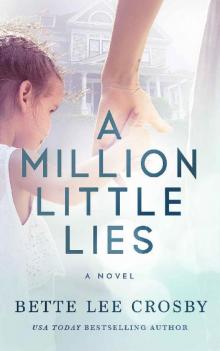 A Million Little Lies
A Million Little Lies Previously Loved Treasures
Previously Loved Treasures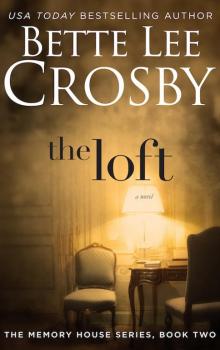 The Loft
The Loft Spare Change
Spare Change Memory House: Memory House Collection (Memory House Series Book 1)
Memory House: Memory House Collection (Memory House Series Book 1) Silver Threads
Silver Threads Wishing for Wonderful: The Serendipity Series, Book 3
Wishing for Wonderful: The Serendipity Series, Book 3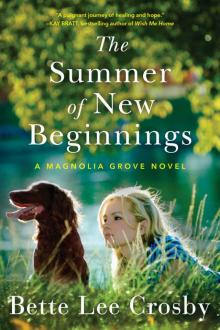 The Summer of New Beginnings: A Magnolia Grove Novel
The Summer of New Beginnings: A Magnolia Grove Novel The Regrets of Cyrus Dodd
The Regrets of Cyrus Dodd Passing Through Perfect
Passing Through Perfect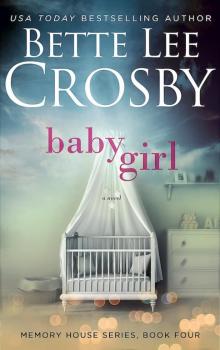 Baby Girl
Baby Girl Jubilee's Journey
Jubilee's Journey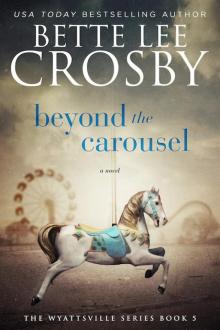 Beyond the Carousel
Beyond the Carousel What the Heart Remembers
What the Heart Remembers Cupid's Christmas
Cupid's Christmas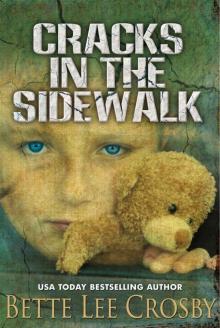 Cracks in the Sidewalk
Cracks in the Sidewalk Blueberry Hill
Blueberry Hill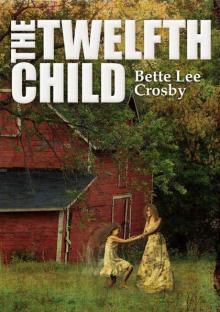 The Twelfth Child
The Twelfth Child A Year of Extraordinary Moments (A Magnolia Grove Novel)
A Year of Extraordinary Moments (A Magnolia Grove Novel)